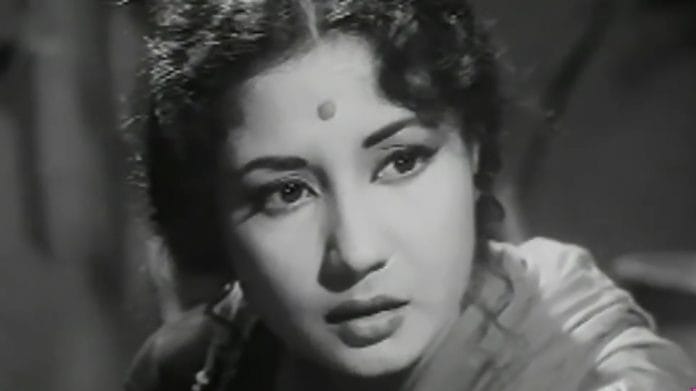Known as the ‘tragedy queen’ of Hindi cinema for her sorrowful performances, Meena Kumari was an unforgettable screen presence in the 1950s and ’60s. By the end of her 33-year-long career, she had 92 films under her belt, including classics such as Pakeezah (1972), Baiju Bawra (1952), Daaera (1953) and Sahib Bibi Aur Ghulam (1962).
She bagged four Filmfare awards over the course of her career and in 1963, received and won all nominations as Best Actress for Sahib Bibi Aur Ghulam. The film, in which Kumari plays a tippler wife, echoes her own struggles with alcoholism, which led to liver cirrhosis and caused her death.
But Meena Kumari was more than the tragedies of her life and untimely death. She was a powerful performer dedicated to her craft, and a singer and poet as well. As Javed Akhtar once put it, “People like Meena Kumari are paradoxes. We try to understand them, we appreciate them, we criticise them, we pity them, we laugh at them, we admire them. But they remain paradoxes.”
On the star’s 47th death anniversary, a glimpse into her turbulent life and flair for poetry that is seldom talked about.
Also read: Meena Kumari was more than just the tragedy queen and this movie shows us why
Roots in theatre & poetry
Born in 1933 in Bombay as Mahjabeen, Meena Kumari grew up in a family of poor theatre artists. Her father, Master Ali Baksh (or Bux), was a veteran of Parsi theatre, music and poetry while her mother, Iqbal Begum, was a stage actor and dancer. Baksh was a Sunni Muslim and Begum, originally Prabhawati Devi, was a Bengali Christian converted to Islam.
Mahjabeen made her film debut as a child in Vijay Bhatt’s Leatherface (1939), playing Baby Meena, a name that would be hers for years, until she was credited as Meena Kumari in Bachchon Ka Khel (1946).
Kumari’s grandfather was the iconic Urdu poet and literary personality, Munshi Pyare Lal Shakir Meeruti, who gained recognition around the early 1900s when his writings began appearing in Zamana, an Urdu literary magazine. Perhaps this was where she got her poetic talent from.
In the late veteran journalist Vinod Mehta’s biography of the actor, he wrote, “Unlike today’s stars, she had many dimensions — she read poetry, had literary friends, aspired to the higher life and was an alcoholic. She also represented that generation of young Muslim girls who were pushed into the film industry so that they could become their family’s meal tickets. Meena Kumari’s family too exploited her and felt betrayed when she married Kamal Amrohi.”
Also read: Sahib Bibi Aur Ghulam took on adultery way before Supreme Court did
Controversial marriage with Kamal Amrohi
Perhaps the biggest controversy of Meena Kumari’s career was her rocky marriage with film director and screenwriter, Kamal Amrohi. The couple tied the knot in 1952 (shortly after the release of Baiju Bawra) and separated in 1964. This was Amrohi’s second marriage; he had two children from the first and none with Kumari.
Film critics said the couple’s estrangement is what made the actor hit the bottle. There was also a rumour that Amrohi divorced the actress in a fit of anger by uttering the words ‘talaq talaq talaq’. However, this has been regarded as false. According to her step-son, Tajdar Amrohi, himself a well-know producer and director, this was a “false belief” spread by “ill-wishers”. In an interview with National Herald, Tajdar said the couple “only lived apart when they had differences.”
In the same interview, he recalls the first time he met the actor. “Back home in Amroha, I had seen Meena Kumari secretly in a film called Chandni Chowk. I had gone to see the film to see who had stolen my father from my mother,” he said. “Anyway, there I was standing close to her. She beckoned me on to the bed. I clambered on inch by inch. I couldn’t bring myself to open my eyes to look at her. When I was close to her she placed my head on her bosom and held my chin. She said, ‘Main hoon tumhari Chhoti Ammi’. No one else suggested I call her that. She said it at that moment. And from that moment she became my beloved Chhoti Ammi.”
Tajdar adds that Meena Kumari’s last and most iconic film, Pakeezah (1972), directed by Amrohi, was made because of him. Amrohi had first thought of it back in the 1950s, but it got stalled many times, due to technical problems and later, due to the couple’s estrangement.
Still, she finished shooting for it eventually, right through her severe illness. The film released on 4 February 1972, and Meena Kumari died of liver cirrhosis the next month, on 31 March, at the age of 39. It wasn’t a big hit initially, but her death triggered “such frenzy that the film became a cult classic”.
Poetry after death
After her death, lyricist and poet Gulzar had Hind Pocket Books publish her writing. In 2014, academician-writer Noorul Hasan published Meena Kumari the Poet: A Life Beyond Cinema, the first English translation of Kumari’s poems. Her poems display a lyrical quality that belies her strong words.
Sample one of her poems that incidentally shares the same title as her last film:
Pakeezah
Siah naqab mein uska sandili chehra
Jaise ra’t ki tariki mein
Kisi khnakah ka
Khula aur raushan tak
Jahan mombat’tian jal rahi ho’n Khamosh
Bezaban mombat’tian
Woh sunahri jild wali kitab jo
Ghamgeen muhabbat ke muqad’das ash’ar se muntakhib ho
Ek pakeezah manzar
Siah naqab mein uska sandili chehra
The translation reads –
The Virgin
Her moon-like face
Under the inky veil
Like the resplendent niche
In a shrine
Illumined with candles
Silent candles
Or
The golden, hardbound book
Containing the pure poetry
Of despondent love
A sacred sight
Her moon-like face
Encased
In a black veil.
Also read: Cinema writer with a golden touch, Abrar Alvi was lost in Guru Dutt’s shadow






